Introduction
China’s Political System
China is often a topic of intrigue and contention when it comes to its political system. The country officially operates under the framework of a single-party socialist republic, with the Communist Party of China (CPC) being the sole governing party. This one-party rule has been a defining feature of Chinese politics since the establishment of the People’s Republic of China in 1949.
Key Features of China’s Political System
-
Single-Party Rule: As mentioned, the CPC holds a monopoly on political power in China. This control extends to all levels of government, from the national to the local.
-
Role of the CPC: The CPC not only governs the country but also plays a significant role in all aspects of Chinese society, including the economy, military, and social organizations.
-
Meritocratic Leadership: While the CPC is authoritarian in nature, it operates on a system of meritocracy in selecting its leaders. Members rise through the ranks based on performance and loyalty to the party.
-
Political Consultative Conference: In addition to the CPC, China has the Chinese People’s Political Consultative Conference (CPPCC), which serves as a political advisory body representing various sectors of society.
Democratic Elements in China
While China’s political system is often categorized as authoritarian or even totalitarian, there are some aspects of democracy present in the country:
-
People’s Congress System: China has a system of people’s congresses at the national, provincial, and local levels. These congresses are elected by the people and have the authority to make decisions on certain issues.
-
Elections: While the elections in China are not like those in liberal democracies, there is a form of electoral process in place. Citizens have the opportunity to vote for representatives at various levels of government.
-
Consultative Decision-Making: The CPC often engages in consultative decision-making processes, seeking input from experts and the public on certain policies and issues.
Challenges to Democracy in China
-
Restrictions on Freedom of Speech: Censorship is widespread in China, with the government tightly controlling media and online content. This limits freedom of expression and the free flow of information.
-
Human Rights Violations: China has been criticized for its record on human rights, including issues such as persecution of dissidents, religious freedom, and ethnic minorities.
-
Limited Political Pluralism: The lack of political pluralism in China means that alternative voices and parties are not able to challenge the dominance of the CPC.
-
Lack of Independent Judiciary: The judiciary in China is not independent and is subject to political influence, compromising the rule of law.
FAQs:
1. Is China a democracy?
China officially operates under a single-party socialist republic system, with the Communist Party of China as the ruling party. While there are democratic elements such as elections, the country is not considered a liberal democracy.
2. Can Chinese citizens freely criticize the government?
Criticism of the Chinese government is heavily monitored and censored. Freedom of speech is restricted, and those who speak out against the government face repercussions.
3. Are there opposition parties in China?
While there are other political parties in China besides the Communist Party, they do not hold real political power or pose a significant challenge to the CPC’s rule.
4. Do Chinese citizens have rights and freedoms?
While Chinese citizens have some rights and freedoms, these are often restricted by the government. Human rights violations have been a significant issue in the country.
5. How are leaders chosen in China?
Leaders in China are selected through a meritocratic system within the Communist Party. Party members rise through the ranks based on loyalty and performance.
In conclusion, China’s political system is complex, combining elements of democracy with authoritarianism. The dominant role of the CPC, coupled with restrictions on freedom and political pluralism, poses significant challenges to democratic governance in the country. Understanding the nuances of China’s political landscape is crucial for grasping its role on the global stage and its future trajectory.

